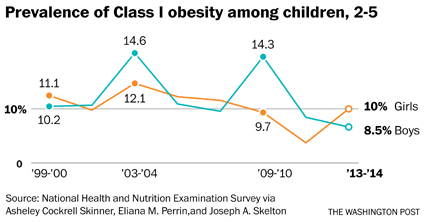Hey, do you remember that breathless CDC study from a couple of years ago showing a dramatic drop in obesity among 2-5-year-olds? I was pretty skeptical about it, and today I learn that I was right to be. I basically figured that it was a noisy sample that didn’t make sense, but according to a new look at the data it’s worse than that: the data is noisy,  and that allowed the CDC researchers to cherry pick a starting point that made it look like there was a huge drop.
and that allowed the CDC researchers to cherry pick a starting point that made it look like there was a huge drop.
Roberto Ferdman provides a new chart based on the new study. Take a look. If you start in 2003, as the CDC study did, it looks like there’s a big drop. The prevalence of obesity among girls goes down 2.1 percentage points, and among boys it goes down a whopping 6.1 percentage points.
But if you include data going back to 1999, which is the true beginning of this data series, the improvement is distinctly more modest: a drop of 1.1 percentage points for girls and 1.7 percentage points for boys. And those drops aren’t even statistically significant.
The original study was always suspect because the alleged drop for 2-5-year-olds wasn’t matched in any other age group. And sure enough, a fresh look at the rest of the data continues to show rising obesity for every other age group. Suddenly the results for 2-5-year-olds look perfectly in sync.
It’s one thing if this newer study shows different results because it includes 2013-14 data. But deliberately excluding the starting point of the data series is the real culprit, and that’s inexcusable. The authors of the original study have some explaining to do.


















